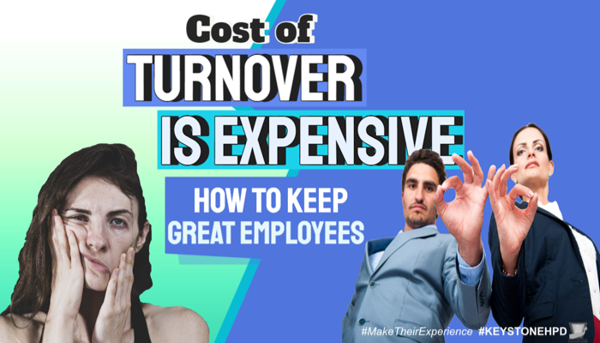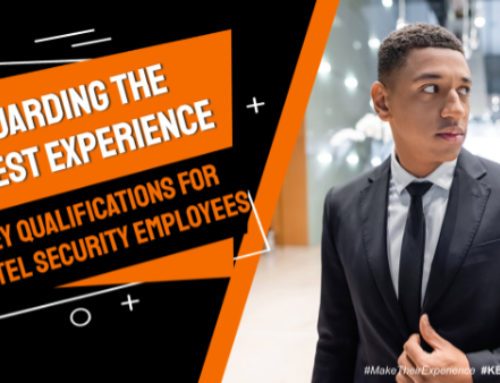.
.
Can you afford the cost of turnover?
How do you find great employees? Employees that share your philosophy, will care about your guests, have great attention to detail?
In this episode, I will tell you how.
Welcome to another edition of Hospitality Property School.
I’m your instructor, Gerry MacPherson.
.
Introduction
If you are the operator of a hotel, resort, inn or bed and breakfast, there is a good chance you have an understanding of the day-to-day operation of your property.
.
In a perfect world, you would clone yourself so you know that everything is done to your satisfaction.
.
Unfortunately, we do not live in a perfect world and you will need help.
.
Depending on the size of your operation, this can be a very time-consuming job.
.
How Do You Find Great Employees?
.
- Employees that share your philosophy.
.
- Follow your operations manual.
.
- Will care about your guests.
.
- Are willing to bend over backwards when offering service.
.
- And have great attention to detail.
.
To begin with, when advertising a job don’t waste your time interviewing everyone who sends in an application. There is a way to weed out many applicants by using a simple technique when writing the ad. In the job description, instruct, to anyone replying, to include a specific word or phrase in their cover letter. A word or phrase you have placed in the ad.
For example: football
.
When you receive the applications, just plan on reviewing those who have included the specific word or phrase. This shows attention to detail and it is a start in the right direction.
.
When it comes to interviewing, you will have two options
- Unstructured interviews
.
- Structured interviews
.
If an interview is unstructured, it doesn’t mean you don’t prepare questions ahead of time. An unstructured interview allows potential employers to ask different questions to each candidate — which could become an opportunity for an employer to judge candidates based on who they get along well with, as opposed to whether the candidate is qualified for the role.
.
A structured interview is a process in which all candidates are asked the same predetermined questions in the same order. It helps you minimize biases or personality preferences that could otherwise affect your decision to move forward with a candidate.
.
 |
Books with Tips & Strategies for Your Hotel, Resort, Inn,
|
.
You have to look at your priorities. Do you want candidates with more hard skills or soft skills?
.
Most companies hire based on hard skills because it’s easy to make decisions on such binary questions as “Do you have 3+ years of experience on the front desk?” or “Do you understand booking systems?” But with such variability in a position requirement – does the answer to that question really help you qualify a candidate?
.
In today’s travel industry, soft skills are becoming more important and you need to look for specific elements during the hiring process. You look to see if the candidate has self-awareness, self-regulation, motivation, empathy and social skills. These are the five elements that make up one’s emotional intelligence.
.
When it comes to hiring individuals, emotional intelligence is really something you have to identify through face-to-face conversation. Can you hear the excitement in the candidate’s voice when they tell you about their work experience?
.
You will be able to judge …
Self-awareness: Have they shown a genuine interest in helping others on their team?
.
Self-regulation: Does the candidate know their own strengths and weaknesses?
.
Motivation: How does the candidate speak about their previous company? What relationships did they build?
.
Empathy: Do they have the ability to understand and share the feelings of others?
.
Social skills: How did the candidate handle a frustrating situation or a missed goal?
.
Look for these cues in the interview stage of your hiring process, and make sure to value those skills just as highly as any technical skill or relevant experience. You can always train candidates on how to make a bed – it’s much harder to teach emotional intelligence.
.
Interestingly, most properties don’t train their employees for soft skills. According to a study by a global human resources consulting firm, only 11% of senior leaders are effective at displaying empathy and maintaining other’s esteem.
.
.
Here are a few suggestions:
- Make sure your on-site content is optimized for job searchers. Do your job descriptions contain keywords that a job seeker might type into a search engine? Are you using their diction?
.
- Use social media to demonstrate your company’s culture, values, and mission. Social media isn’t just a high-level marketing strategy, it’s often a candidate’s first touchpoint with your business.
.
You can try starting a LinkedIn group where prospective candidates can ask you questions. Put your own Twitter handle on your careers site so candidates can tweet your messages and follow your posts.
- Use specific qualifications that candidates can quickly identify with.
.
Your goal should be to build trusting relationships. Showing people that your business cares to develop their skills and help them grow their careers. Once you’ve done this, you’ll have a much easier time approaching your perfect candidates when that perfect opening comes up.
.
During the first interview
start with your
- Business History
.
- Experience and Philosophy
.
- Your Properties & Responsibility Guidelines
.
Meet with each applicant individually to discuss their reactions to and feelings about the guidelines., as well as their background and experience.
.
.
Structured Interview Questions
To create structured interview questions, you must first craft a detailed job description with all the necessary components of the role, as well as any “nice-to-haves”. Once you have a job description, which should be included in your operations manual, use it as a guide to writing a list of hard and soft skills you’re looking for in a candidate.
Next, you’ll want to create a list of role-specific questions. For instance, you might consider asking:
.
- Give me an example of a time you had to [important job skill].
.
- What do you think will be your biggest challenge with this role?
.
- What most excites you about this role?
.
- Tell me how you would handle [specific job challenge].
.
These questions will vary depending on the role. You’ll also want to gauge the candidate’s interest in your company in general, as well as their work ethic.
.
.
Here are a few general structured interview questions:
- Can you tell me a little about yourself?
.
- What do you know about the company?
.
- What are your greatest professional strengths? Alternatively, what are your weaknesses?
.
- What is your greatest professional achievement?
.
- Where do you see yourself in five years?
.
There are structured interview questions you might want to ask to get a better sense of someone’s leadership skills, willingness to learn, or the ability to handle themselves under pressure.
.
Take a look at the following structured interview questions, divided by category, for further inspiration.
.
.
To rate leadership ability
- You indicated on your resume that leadership is one of your strengths. Describe an experience in which you used your leadership abilities.
.
- Tell me about a time when you delegated a project to others effectively.
.
- Tell me about a time you took the lead in a team project. What was the project outcome?
.
- Can you recall a time where you had to give negative feedback to a colleague? How did you express this feedback?
.
.
To rate dependability
- If your manager asked you to complete a task you thought impossible at first, what would you do?
.
- Tell me about a time when you had multiple important projects to finish and how you prioritize them.
.
.
To rate willingness to learn
- Tell me about a time you failed at a project. How did you try to avoid failure? What did that experience teach you?
.
- Tell me about a time you had to learn something you weren’t familiar with very quickly.
.
- Which other companies in the hospitality property industry do you admire? Why?
.
.
Keep in mind
A structured interview has plenty of benefits — but, of course, it also has its drawbacks.
.
A structured interview leaves little room for building rapport. When a candidate answers a question, you move to the next question, even if the following question has little relevance to the candidate’s unique response.
.
If you feel a structured interview is too rigid for your workplace, but still want to use general guidelines to ensure fairness in your recruitment process, you might consider a semi-structured interview as an alternative.
.
A semi-structured interview still requires you to create a list of open-ended questions, and subsequently ask role-specific questions.
.
This type of interview also provides more opportunity for you to tailor the conversation naturally, either by excluding questions you feel are redundant or asking follow-up questions when you feel it’s necessary.
.
Ultimately, a semi-structured interview requires you to follow a predetermined set of questions but allows it to feel more conversational by nature.
.
Does this make sense so far? Let me know in the comments.
At this meeting, each applicant should also be asked why they feel they were right for the position.
.
The next phase is very important; role-play with situations they will probably encounter at any property. Make it clear that you do not want them to answer the way they think you want them to answer, but to react the way they feel would be right.
.
This should be done for every position at your property. You have to remember your priority is customer service and all your employees should embrace this, as studies have shown that the better the customer service the higher the profits.
.
Hire those who show empathy, kindness and humility.
.
“Wait a minute!” You might be thinking. “Isn’t experience more important?”
.
“Emotional skills can’t be taught, you can’t give staff the wish to bend over backwards for customers. Hire for the emotional skill, train for the others.”
.
The first day of training for a new employee should:
- Start with a meeting with you.
.
- A review of the properties policies and any employee benefits.
.
- They are now a part of your facility’s family & that you are there to support them.
.
- Take the new employee on a tour of the facilities, highlighting people & systems at work.
.
- Answering clearly & fully all the employee’s questions
.
- Issuing the employee their uniform
.
- A copy of the operations manual
.
- Review the operations manual
.
- Review the contract of the employee’s position and any Employee Benefit Plans
- Complete the employment papers
.
You might be thinking “This is a lot of time to be taking on one new employee.”
.
Think of it this way. Isn’t better to spend the time upfront and to get your employee off on the right foot or take the time down the road to replace them?
.
How do you keep great employees? This next point I cannot stress enough … support them!
.
A customer is not always right but they should feel like they are. For this to work customer has to feel the staff is on their side and the staff have the flexibility to handle situations the way they see fit.
.
Give them the ability to look for customer service opportunities and WOW your guests.
.
Customers should not just leave your property satisfied but happy and this is much easier to carry out if you have great employees.
.
I have seen hospitality property owners go from one extreme to another when it comes to their hiring process. One property owner might take the time to study the candidate and ask thoughtful questions while another might look at a new person and say “Do know how to use a computer? Okay are hired.”
.
For it to work, the interview process has to be consistent. It has to be scripted the same way every time.
.
As in all other tasks in your hospitality property, your hiring process should be documented in your operations manual.
.
When looking for new employees, before doing anything else, talk to business associates, colleagues and competitors. You might find that a little strange but if you have a good working relationship with your competition, they could be a great source of information.
.
What is the next step?
.
When you have found candidates that you feel might be suited for the position, you will want to talk with them individually and ask the following type of questions.
.
Where have you been employed in the past and what did you learn from those experiences?
.
How long were you employed in your previous position?
.
Why would you like this to take your position?
.
Why do you feel you’re suitable for this position?
.
What do you have that other candidates don’t?
.
Ask about handling a customer complaint; an emergency; a problem while working with a team.
Let them talk!
.
What accomplishment are you most proud of personally, as a team member?
.
What would you do if you find your co-worker stealing, doing any wrong activities or spreading rumours?
.
What would you say if I told you this interview was going badly?
.
Why haven’t you progressed more in your career?
.
Is that the best answer you can give me? Let’s move on.
They may sound a little harsh but they are nothing compared to angry customers yelling at you because the rooms are not ready.
.
Why do you want to work with our property and what are your goals in the future?
With this question, you can best judge the candidate on their expectations from this job and if their future plans involve working with your property.
.
In general, I do not feel is appropriate to ask about a person’s age, gender, sexual preference, religion, family planning or political leanings when it comes to hiring at hospitality property.
In some countries these questions are illegal.
.
It is here you can decide if the candidate is right for your property and you can invite them back for a second interview or hired them.
.
For some of you might seem a little much, for others is totally clear, either way, the step-by-step process, if done consistently works and your reward that – incredible, loyal employees.
.
To go more in-depth with the employee interview process, check out our training tutorials at keystonehospitalitydevelopment.com
.
.
In Conclusion
.
Provide professional experience through the interview process. The candidate experience is instrumental in giving candidates a positive feeling about your property.
.
And remember, emotional intelligence and ‘soft skills’ are often more impactful to a hospitality property employee’s success than their technical skills or existing experience. Hire for character, train for skill.
.
.
Where have you found your best employees?
Let me know in the comments.
.
.
You will have access to this post for six weeks before it gets locked in the “vault” for Hospitality Property School Group members only. When you see that we have something new, don’t mark it “Unread” or file it away in the belief you’ll read it later because you might miss your chance.
.
To see all the other valuable material you’d have access to as a member of the Hospitality Property School Group, check out the short video.
.

.
.
In the next episode, I will be talking about improving your employee’s work experience.
.
That’s it for today’s episode,
Until next time, have a fun day.
.
.
PS. Are you signed up for INNsider Tips? You can find the link in the show notes.
.
.
⇒ TO READ OR LISTEN TO THIS EPISODE ON KEYSTONE HOSPITALITY PROPERTY DEVELOPMENT:
https://keystonehpd.com/Cost-of-Turnover-is-Expensive-211
.
.
Get Your INNsider Tips
https://keystonehpd.com/Sign-up-for-INNsider-Tips
.
.
Join one of your private groups
https://keystonehpd.com/private-groups
.
.
Say hi on social:
Facebook: https://www.facebook.com/KeystoneHDC
.
Twitter: https://twitter.com/KeystoneHDC
.
Linkedin: https://www.linkedin.com/company/keystone-hospitality-development
.
.
Listen to The Hospitality Property School PODCAST here:
https://keystonehpd.com/itunes-podcast
.
https://www.spreaker.com/keystonehdc
.
.
YouTube
.
.
A Division of Keystone Hospitality Property Development
.






